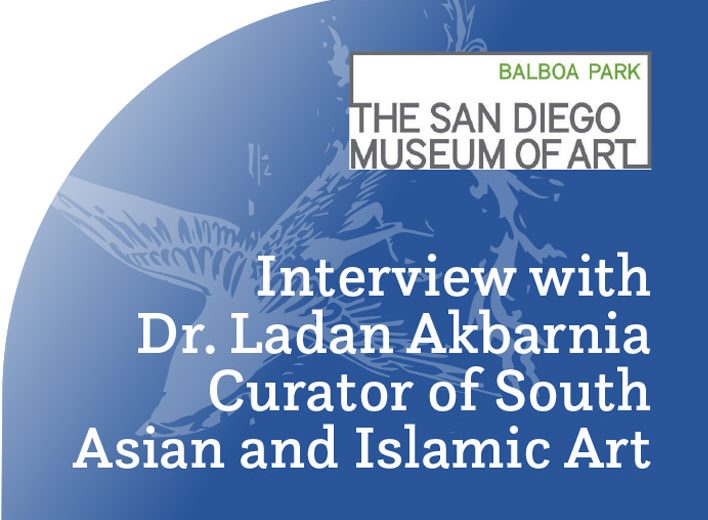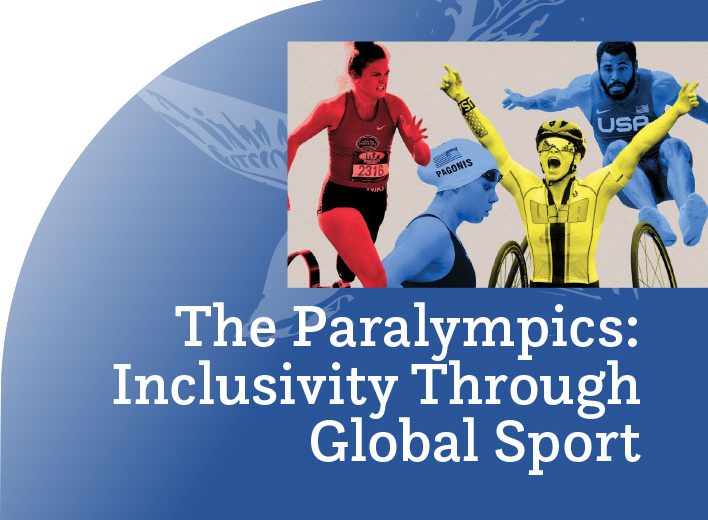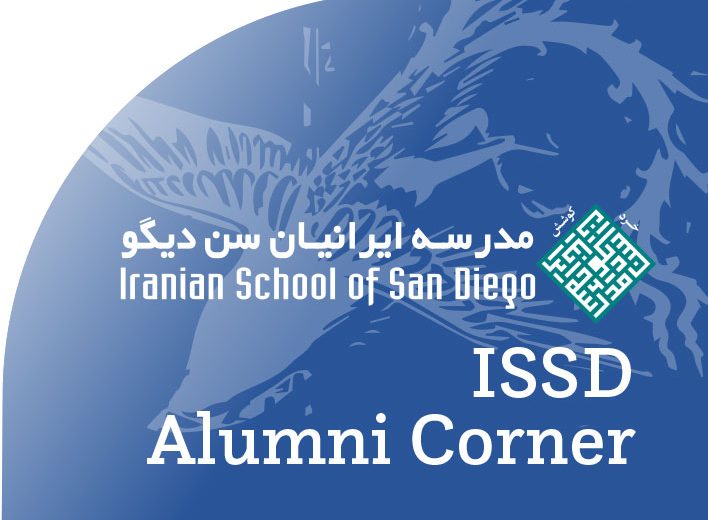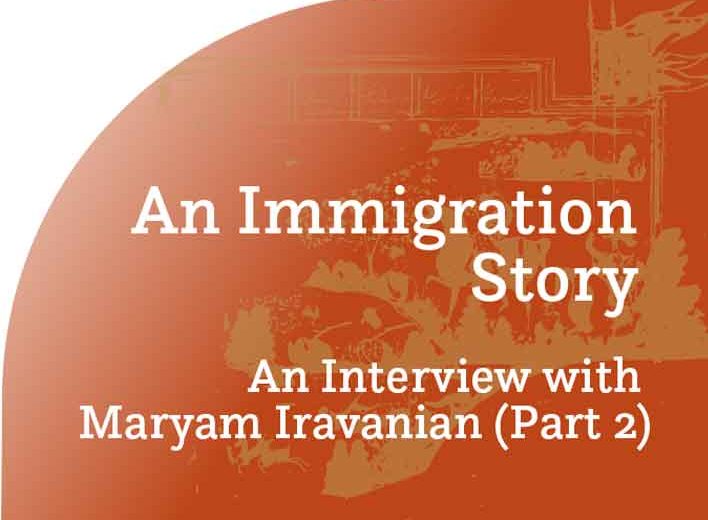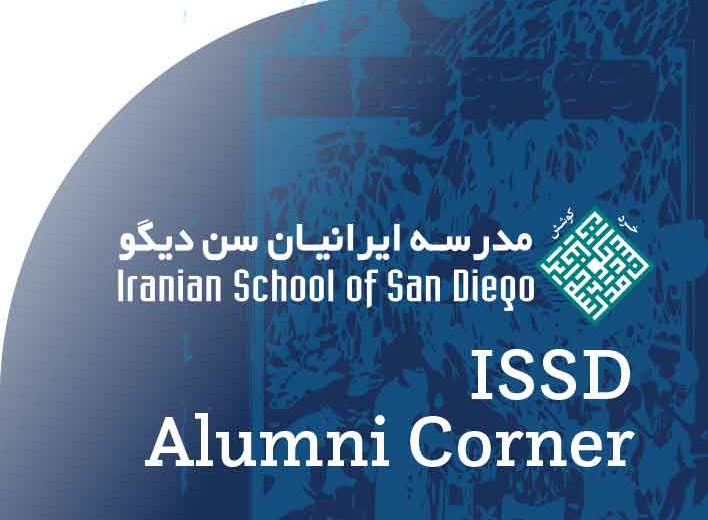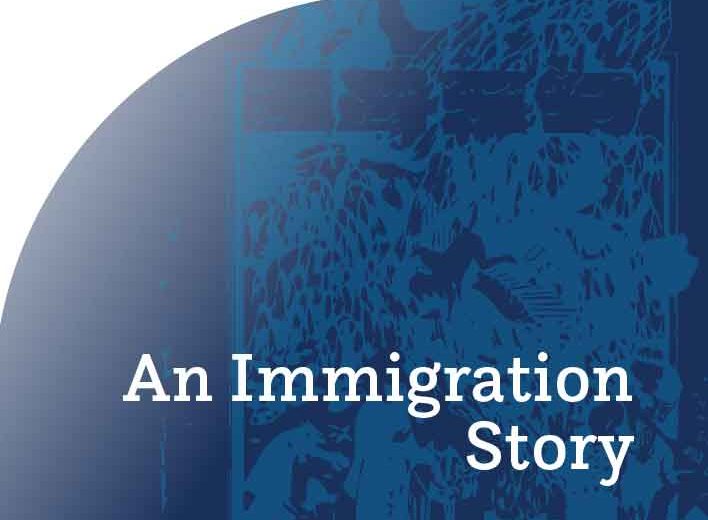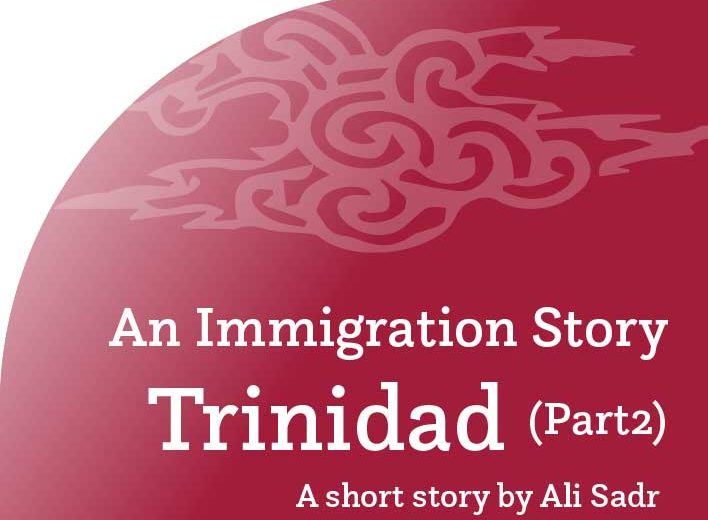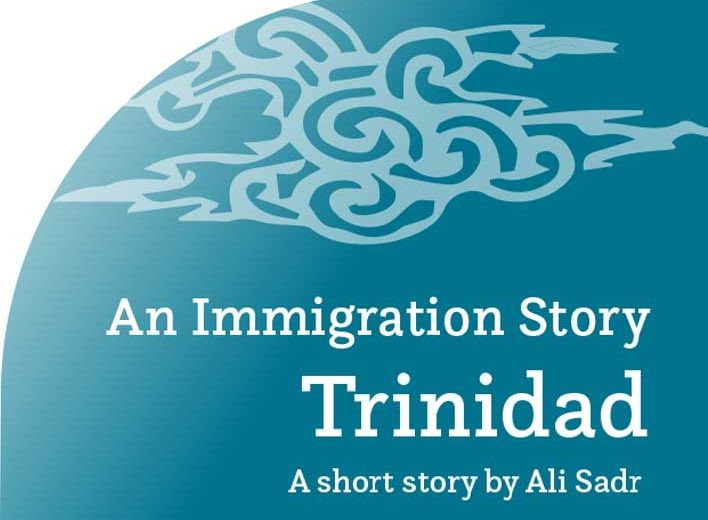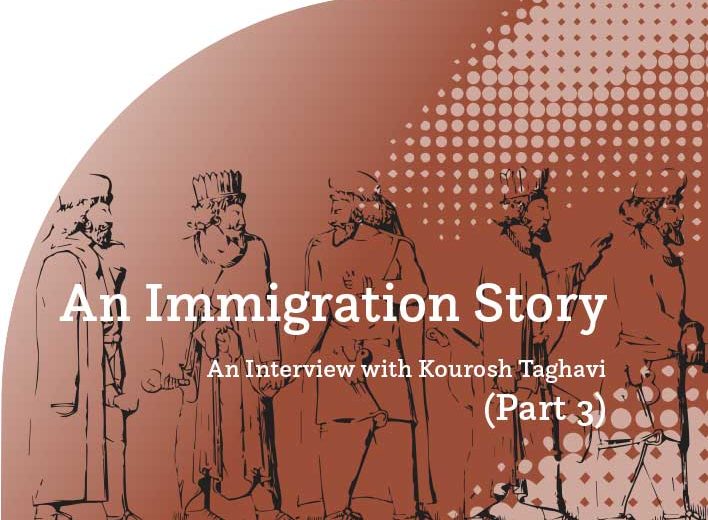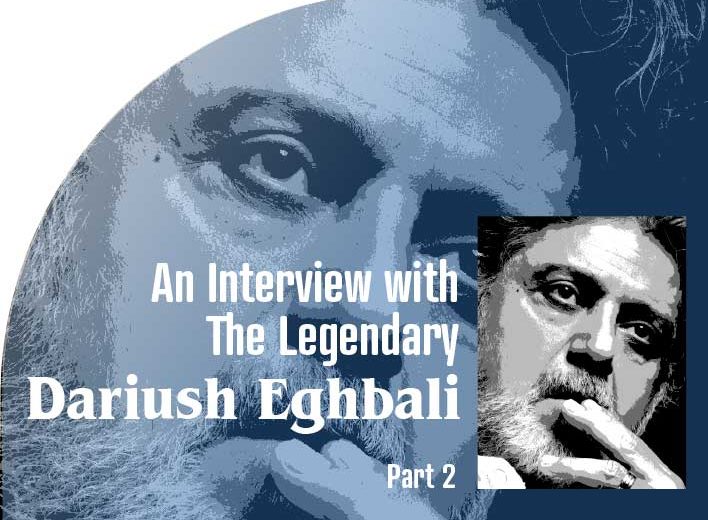An Interview with The Legendary
Dariush
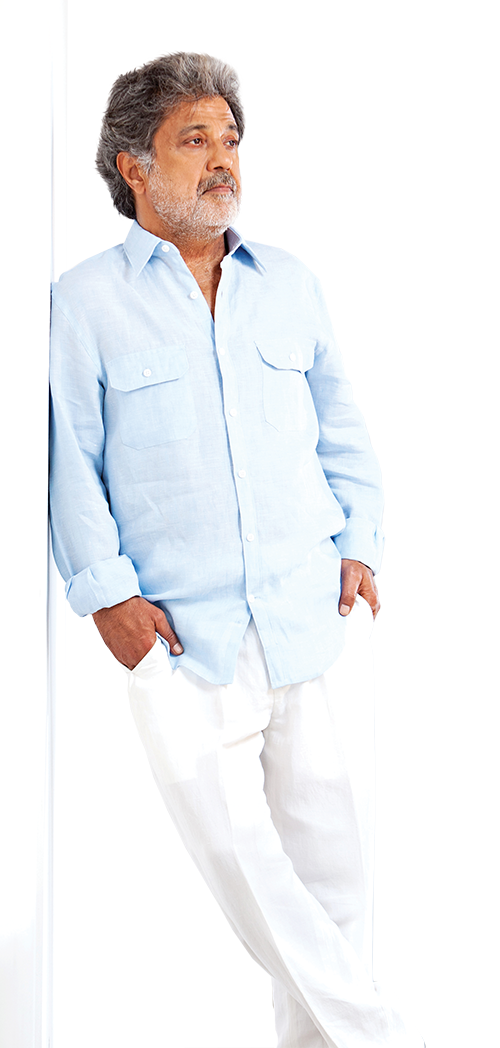 Dariush Eghbaly, the legendary singer of Iran, does not need any introduction. Many people know at least a few of his songs by heart. Dariush not only is one of the best singers of the last five decades, but he is also an entrepreneur, humanist, intellectual, and activist. This is our second interview with Dariush. The first one was in Peyk #117 (2008). In that interview, which was conducted by our colleague Mersedeh Mehrtash, Dariush spoke about his artistic life as well as his social activities. In the past fourteen years, many things have changed. I am honored that Dariush found time in his busy schedule to sit down with me and update our readers about his art and his beloved Ayeneh Foundation. Here we present the first part of the interview which is mainly about the world of music. The second part will be in the next issue of Peyk and will be about his social activities.
Dariush Eghbaly, the legendary singer of Iran, does not need any introduction. Many people know at least a few of his songs by heart. Dariush not only is one of the best singers of the last five decades, but he is also an entrepreneur, humanist, intellectual, and activist. This is our second interview with Dariush. The first one was in Peyk #117 (2008). In that interview, which was conducted by our colleague Mersedeh Mehrtash, Dariush spoke about his artistic life as well as his social activities. In the past fourteen years, many things have changed. I am honored that Dariush found time in his busy schedule to sit down with me and update our readers about his art and his beloved Ayeneh Foundation. Here we present the first part of the interview which is mainly about the world of music. The second part will be in the next issue of Peyk and will be about his social activities.
It should be noted that this interview was conducted in early September 2022, prior to the recent protests and unrest in Iran and around the world. I should also mention that this interview was conducted in Persian. The English translation is done by Dr. Abbaseh Towfigh. I am grateful for the effort and for facilitating the logistics of this interview.
-Ali Sadr
Ali Sadr (AS): Dear Dariush, I sincerely thank you for the opportunity you gave me and our readers to have this interview. I have been a fan since my college days in the mid-1970s. Your voice and songs were part of the silent nights and days of demonstrations and strikes. And they still are. Let me start with this question: Few artists have been able to maintain the quality of their work for nearly fifty years. What is the secret of your success?
Dariush: Where art thrives and evolves, so does freedom of expression. Art can directly empower the most vulnerable people in society, and purposeful art can create social change. Throughout history, artists in all fields have tried to commit themselves to creating works of art that address the social harms that plague their societies. Through creating a platform for reflection, empathy, common language, and unity, these works of art echo the pains and concerns of the voiceless communities. We grow up with stories, we live with grief, and we look to the future with fear. Nowadays, most people appear to be living with their memories rather than chasing them to reflect on their path toward a better future. Of course, we should not forget that our identity is a reflection of the bittersweet events of our past. Sadly, suffering and coping have a very deep rooted place in our culture.
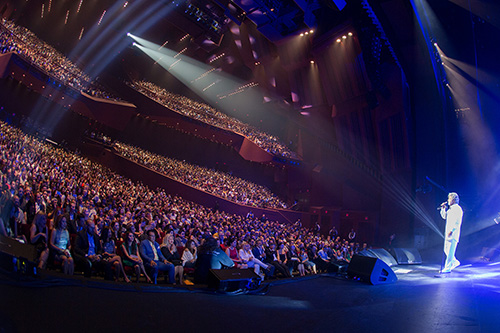
The journey that I started with my Iranian compatriots more than four decades ago has always been full of messages and expressions in the form of poetry and song, in relation to our common, historical, and social pains—pains that sometimes sadly may have been caused by our own deeds. But I do not doubt that we have all learned that life means rising after each fall, life means sprouting again after every drought, life means rebuilding after each destruction… .
During this half-century, my compatriots were in tune with me, they stood by me, they have been sympathetic and commiserative. And this year, the glory of this relationship and their support have inspired me to talk to my compatriots about the power of unity, teamwork, and the vital need for commitment. A commitment that is composed of three principles: reality, responsibility, and purpose. Why do I say teamwork? Because whether we like it or not, we are all Iranians and we have common pains, a deep sense of belonging and yearning for a bright future for our homeland, a deep feeling that stems from our heart and soul with love for our country.
A glance at our history shows that about 25 years ago, we witnessed the explosive growth of underground music in Iran. This is one of the signs that although art and music are in the grip of censorship and suffocation, they have not remained silent and stagnant, despite the fact that for generations, in our land, the right to live, the right to economic, social, political, and artistic growth and prosperity have been denied to people in the cruelest way. In such an atmosphere, artistic activities face very strong and dark barriers, considering the violation of all kinds of human rights in our country. But overall, I believe that an artist and art in general can turn their audience into an activist, and then to a listener, and finally to a productive and thoughtful human being by inspiring a sense of motivation.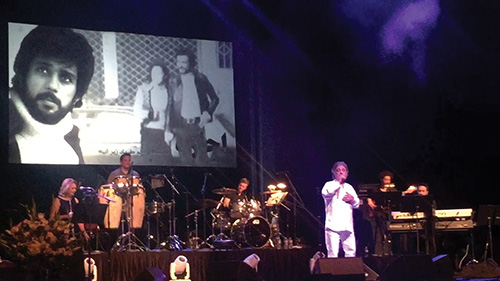
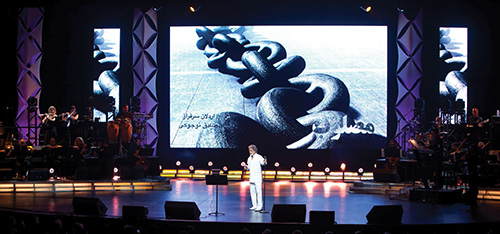
Art can achieve so much by questioning the obvious and by touching the bubble of denial and compromise. In the land where feelings are assassinated, dreams are put to sleep with tranquilizers, and motivations die a gradual death, growth and development in every social field are crushed to oblivion. But art in our land is still alive and active, despite all the tyranny, pain and suffering; perhaps musical instruments and microphones are the strongest weapons. We have always expressed our feelings, emotions, heartbreaks, and desires through music, poetry, theater, cinema, sculpture, and other forms of art. This trend, from my point of view, will never end. They always say that where words fail, music speaks… .
AS: What is the most important criterion for you in choosing a song?
Dariush: Music and lyrics are the fabric and alphabet of every nation, and the artistic history of every nation is like a mirror in which the social, political, and religious changes of the society can be explored and examined. The language of music and lyrics can perhaps penetrate the depths of people’s existence more expressively and movingly than speech and conversation; that’s why songs with a cause have remained in the heart and souls of generations far more than books and manuscripts. Every living creature needs a mediator to communicate with its kind, and for us earthlings, one of these mediums is the language of art. Political and social changes and, from my point of view, ”globalization” have played a big role in the growth of artistic expression, not only in our country but all over the world. This globalization has always shown itself in different dimensions. That is why philosophers, poets, and writers from the distant past, such as Socrates, Razi, Farabi, Molana, Hafez, etc., always wrote about the fate of the world, love, and solidarity.
The fact that our share of life is more than oppression and injustice has grown up with me since my childhood.
My choices in my social and artistic life stem from my sentiments, perspective, and sense of responsibility and purpose. Today, even though there is talk of globalization everywhere and many are struggling with globalization in some way or another, many people have taken refuge in isolation and see it as the only option to protect themselves against their surroundings. Even though we are witnessing an explosion of information all around us, we are still witnessing loneliness and deeply shared wounds. This is the momentum for the birth of a phenomenon in the world of art and especially music that brings us closer to each other. With all the undeniable differences that exist in each of us, we have something in common that can be used as our common denominator to strengthen our sense of compassion and unity.
The aspirations and ambitions of each generation are formed by the socio-political conditions they experience. The intellectual and artistic growth and development of each generation will naturally be different from that of the previous generation and the one to come—from ideals to political changes, from the spirit of the younger generation to the social harms that our country has been dealing with. The world of music has never been stagnant and has not and will not lose its place as a form of expression for a protesting generation. Because in the history of countries like ours, affected by the violation of human rights, the souls of poets, authors, lyricists, and artists in general are wounded and tortured; the arena of artistic expression with a purpose will continue to evolve and grow until the wounds of their society are healed.
In general, the world of art is not excluded from the real world and artists are the same as any other member of society. Artists should not be ostracized, censored, or exiled. Highlighting human feelings is not the only responsibility of an artist. In my opinion, revealing the truth is the duty of all purposeful artistic expressions and many artists pay a very dear price for fulfilling this responsibility.
AS: Until ten or fifteen years after the revolution, pop music was not produced in Iran and the market was limited to pre-revolution music or music produced in Los Angeles. Slowly, music in Iran found its own identity. How do you see the purpose of art in today’s world and do you see a clear difference between what is produced in Iran and what is produced in Los Angeles and generally outside of Iran?
Dariush: The survival of any Iranian artist in exile, in my opinion, is like a miracle considering the enormous toll that copyright infringement plays on their livelihood. It is not a secret that many artists abroad do not enjoy a very great deal of financial support when it comes to such areas as artwork, plays, literary works, and concerts. This painful fact, along with all the ups and downs that we immigrants have to endure in order to make a living, makes life quite a challenge.
As for music in particular, much like our socio-political state of affairs, it is like crossing a bridge and undergoing many transformations of its own; it is always flowing like a river. The ups and downs of the art world are also natural, but we should never forget that there are still those artists in every field who have preserved the Iranian culture with their heart and soul, and there is no doubt that this deep love and motivation is in line with a deep desire to preserve our culture and identity.
Your question, I believe, refers to singers in particular. Unlike domestic artists who have the support of 80 million people, artists in exile are trying to make a living with the support of about 5 million Iranians, all of whom live scattered in different countries and continents. All this distance between our compatriots and all the artists who are desperately trying to keep the world of art alive have created a big gap between supply and demand. This is a very complex and debatable story that is not in the scope of this discussion.
Sadly, this is the status quo of artists in exile who, at least during the first 20 years after the revolution, tried to satiate the soul of their compatriots to the best of their ability. They tried to stand by their compatriots in difficult times. Given the lack of any legal recourse in the world of audio and video recordings—and while the production companies abandoned vocalists, poets, lyricists, composers, and arrangers in dire straits—it was the artists who did not stop working and continued to produce their works, despite the fact that there were no profits in this industry whatsoever. Ultimately, artists became producers themselves who remained steadfast in their work despite all these challenges.
Happiness in society is directly related to the level of participation and productivity of each member of that society. I believe the supportive presence of people and organizations, and their participation in artistic, social, and cultural affairs, are all considered as social capital. Today, all over the world societies yearn for hope and compassion. Today, love of reformation and passion for being creative and productive don’t know any boundaries; every place of gathering, from concert halls to sports stadiums, can be a venue for encouraging a goal-oriented and future-building movement. Although some may look for an opportunity to forget and just live in the moment, I am looking for an opportunity to reflect, awaken, and turn the pages of life and look for opportunities to create change. The language and message of art have had an undeniable effect on global uprisings against injustice, poverty, and tyranny, and we can use targeted art as a heartfelt tool to enlighten and motivate society. Street paintings, graffiti, poetry, plays, documentaries, and many other artistic genres can, directly and indirectly, awaken the society and support movements and uprisings against injustice in the world.
I have always talked about the dichotomy of the selfless and the greedy in the world, and how these two will never exchange their subsequent places. Values such as truthfulness, honesty, and justice do not know any political, social, gender, and religious boundaries. No one will give these values to us, so we should all fight for them in solidarity and institutionalize them with the language of art. It is true that all of them are our rights, but without a sense of responsibility and a conscious and purposeful effort of each individual in society, they will never be easily obtained. In this regard, all artists can be the voice of their society and even the world.
AS: Is the poem and the message of the word more important to you or the song and arrangement?
Dariush: Music has a direct effect on different aspects of our lives and even other living beings, to the extent that even experts use it as a therapeutic tool. But it might not be far from the truth if we say that music, without words, is incapable of expressing a wide variety of emotions and expressions.
I grew up in a land where having a right was not only a myth but, even more painful, sometimes people have apprehension to hear that they have rights. In general, many are alien to the fact that they do indeed have rights, when in fact having rights is like oxygen and neither I, nor anyone, anywhere in the world can live without oxygen.
AS: At least two generations of Iranians remember your voice and your songs and are your fans. Given that these two generations usually do not agree on anything, what do you believe is the reason for this consensus?
Dariush: Some believe that the only meaning of art is love. When you are inspired and moved by society, when you share its pain and suffering, as well as its jubilation and joy, you will put your heart and soul into encouraging and moving society toward developing, healing, and a collective sense of harmony with love. Because the purpose of art is to create social compassion and a sense of belonging—art is the language of love that conveys bittersweet facts into our souls. From my point of view, humane and social concepts are much more effective with the language of love. Today, we are witnessing the disintegration of different strata of our societies; the intensification of division is unfortunately clearly visible at the top of the self-centered goals of power mongers all over the world. This is where the universal language of art, art therapy, and knowledge of art sociology can come into play as a mending tool. This is where art can connect this separation of perspectives, emotions, and visions, and encourage and invite collective sentiments. This is not just a dream for me, it is also a goal. So, in fact, all my songs are my messages of love.
My ideals have always been and are based on non-ideological, nonreligious, nonpolitical, and non-cultural ideals, and I consider art to belong to the people. My artistic endeavors, like my social objectives, belong to the people. I have always tried to fulfill my ideals. I refuse to be the victim of any expediency and I have always tried to implement the path of artistic expression with purpose. The sincerity and honesty in the emotional relationship I have with my compatriots is rooted in the fact that I share their pain and suffering. Being of service has made me more determined, at every step of the way, to keep in touch with my compatriots through different channels to maintain this glorious relationship. Perhaps one of the reasons for the longevity of this relationship is that they consider my songs to be their unspoken words and a reminder of what should be and what has not come to fruition.
Art, like politics, if purposeful, will always be long-lasting and influential. Today—in a world devoid of truth, devoid of a deep sense of humanity, in the torrent of social harm—building trust and encouraging empathy is a vital need and necessity.
Unfortunately, a large section of our society lives with despair and intimidation; this is where the duty of all those who have a pen, a microphone, a camera, or a phone in their hands becomes much more important than in the past. In the words of George Orwell, “In a time when lies are a common fact, speaking the truth is a revolutionary act.” I cannot have peace and I don’t easily compromise with challenges, that’s why I always look for a better solution and a more expressive venue to bring awareness, to empower, and to inspire. Fortunately, this opportunity came to fruition in 2017 when on December 10, on International Human Rights Day, Ayeneh Foundation’s educational and satellite 24-hour media went on air worldwide.
Today, we are the only non-profit organization that empowers communities around the world, seven days a week. Regarding social harms and maladies, our aim is to empower society with awareness, education, and prevention, through a completely independent media, with the help of non-profit organizations and experts in various fields.
___________________________________________________________
The second part of this interview will be presented in the next issue.


